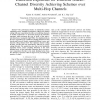Free Online Productivity Tools
i2Speak
i2Symbol
i2OCR
iTex2Img
iWeb2Print
iWeb2Shot
i2Type
iPdf2Split
iPdf2Merge
i2Bopomofo
i2Arabic
i2Style
i2Image
i2PDF
iLatex2Rtf
Sci2ools
ICC
2007
IEEE
2007
IEEE
Distortion Exponents for Different Source-Channel Diversity Achieving Schemes over Multi-Hop Channels
— The performance limits of multimedia systems combining source (multiple description) coding and channel coding with user cooperation diversity over multi-hop channels is studied. Performance is measured through the distortion exponent, which measures the rate of decay of the end-toend distortion at asymptotic high SNRs. Two implementations for user cooperation are considered: amplify-and-forward and decode-and-forward. Results comparing different source and channel coding schemes show that optimum channel coding diversity provides the best performance, followed by source coding diversity. The results also show that at low bandwidth expansion factor, source encoding distortion is the main limiting factor. As the bandwidth expansion factor increases, user cooperation diversity is the main limiting factor, thus, the distortion exponent could be improved by increasing the number of relays.
Related Content
| Added | 02 Jun 2010 |
| Updated | 02 Jun 2010 |
| Type | Conference |
| Year | 2007 |
| Where | ICC |
| Authors | Karim G. Seddik, Andres Kwasinski, K. J. Ray Liu |
Comments (0)

